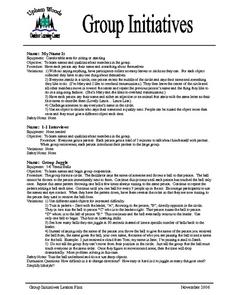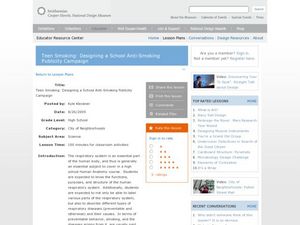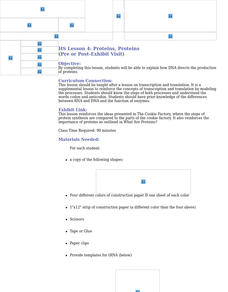Curated OER
Body Organization and Organ Systems
Eighth graders begin the lesson by building a house of cards. They discuss ways that building a house of cards is similar to the way the body is built: different systems work together to help the whole body work together. Students listen...
Curated OER
Activities of the Immune System (Activity 1)
Students cut an apple in half and cover half with plastic wrap. They place drops of liquid on each half and discover how our skin protects us. They answer discussion questions to end the lesson.
Curated OER
Chromosomes
Students explore genetics, chromosomes and DNA. In this genetics lesson students design a chromosome and identify a family tree through genetics.
Curated OER
Inside Information
Students explore two pathways for information through the nervous system. The pathways for involuntary action or reflex and voluntary responses are built and related to the element of choice.
Curated OER
Science: About Your Body
First graders examine body systems and demonstrate their competency in a quiz game show. Lessons cover the brain, heart, lungs, digestive system, muscles, and bones. Students , in teams, answer teacher-created questions in the game.
Curated OER
The Nervous System from A to Z
In this nervous system alphabet book worksheet, students study 26 neuroscience terms as they read the 26 terms and their definitions in the glossary. Some of the terms included are: receptor, unipolar, white matter, axon, hemisphere,...
Curated OER
Noncommunicable Diseases
In this noncommunicable diseases instructional activity, learners determine which diseases are not caused by pathogens and where a tumor is located. Then they describe a chronic disease that has a faulty immune system. Students also...
Curated OER
Defense Against Infectious Diseases
In this infectious disease defense instructional activity, students will review the immune system including acquired, antibody, and cellular immunity. Students will then compare passive and active immunity to infectious diseases. This...
Curated OER
Biology - Life Cycles Game
Students develop a working vocabulary of terms related to the life cycle. In small groups, students play the life cycle's game which consists of matching and defining vocabulary. Directions for creating the game board are included with...
Curated OER
Group Initiatives
Students explore the names and qualities about members in the group. They each say their name and something about themselves. Students gather around in a circle. They listen to the teacher as he or she says the name of someone and throws...
Curated OER
Teen Smoking: Designing a School Anti-Smoking Publicity Campaign
Students review the human respiratory system and the effects on the human body. In this design lesson students brainstorm and create a prototype then present it to the class.
Curated OER
Are Enzymes Specific for Their Substrates?
Students discover enzyme to substrate specificity. The experiment uses samples of glucose and lactose in combination with the enzyme lactase. Students observe the reaction between the lactose and the lactase; the lack of a reaction...
Curated OER
The Laughing Brain 1: How We Laugh
Students to rate themselves on a scale from 1 to 10 (10 being the happiest) as to how happy they feel and write their rating on a sheet of paper. They explore gelotology (the science of laughter) and its benefits to our social, mental,...
Curated OER
COMPARISON OF FOUR-, SIX-, AND EIGHT-bp CUTS IN CALF THYMUS DNA
Students use this laboratory exercise, restriction enzymes to recognize a four-, six-, and eight-nucleotide sequence. Assuming that the four component nucleotides (A, C, T, G) are distributed randomly within a DNA molecule, then any...
Curated OER
Types of Scientists
In this science worksheet, students match each type of scientist listed in the left-had column to its correct description found in the right-hand column. There are 34 different scientists to match on the sheet.
Curated OER
Collecting Plankton
In this science worksheet, students learn facts about plankton by reading two pages of factual information. Students read about the different kinds of plankton and how it is classified. Detailed drawings are included. There are no...
Curated OER
Bones: The Body's Support
In this bones worksheet, students compare the axial and the appendicular skeletons. Students also review the bone components. This worksheet has 6 matching, 8 short answer, 4 fill in the blank, and 6 true or false questions.
Curated OER
The Chemistry Connection
In this proteins instructional activity, students read about the chemical compound, protein. Students determine where proteins are found in the body and how enzymes help the body react. Then students complete 3 short answer questions.
Curated OER
Ferns and Gymnosperms
In this plant learning exercise, students review the different characteristics of ferns and gymnosperms. This learning exercise has 12 fill in the blank questions.
Curated OER
When Germs Attack!
Students explore the hidden world of microbes and how our bodies spring into action in response to diseases. This ten lesson unit presents data on several microbial diseases and the reaction of the body's immune system.
Curated OER
Broken Bones
Students listen to a lecture on broken bones. They review the proper first aid techniques and practice setting splints on one another. They observe X-rays and animal bones.
Curated OER
Human Development: The First Trimester & Developmental Malformations
Students, analyze and discuss cleft lip, cleft palate, anencephaly, spina bifida and septal defects in the heart--well-known malformations that can occur in the first trimester of prenatal devalopment. They play the review game, Fetal...
Curated OER
THE FARMER CARES FOR THE LAND
Students will identify cause and effect relationships in issues relating to Agriculture and the environment.Ask students to describe what farmers do. Then ask students to define the word "environmentalist." Ask students if they have...
Curated OER
Genome: The Secret of How Life Works
Students explain how DNA directs the production of proteins.

























